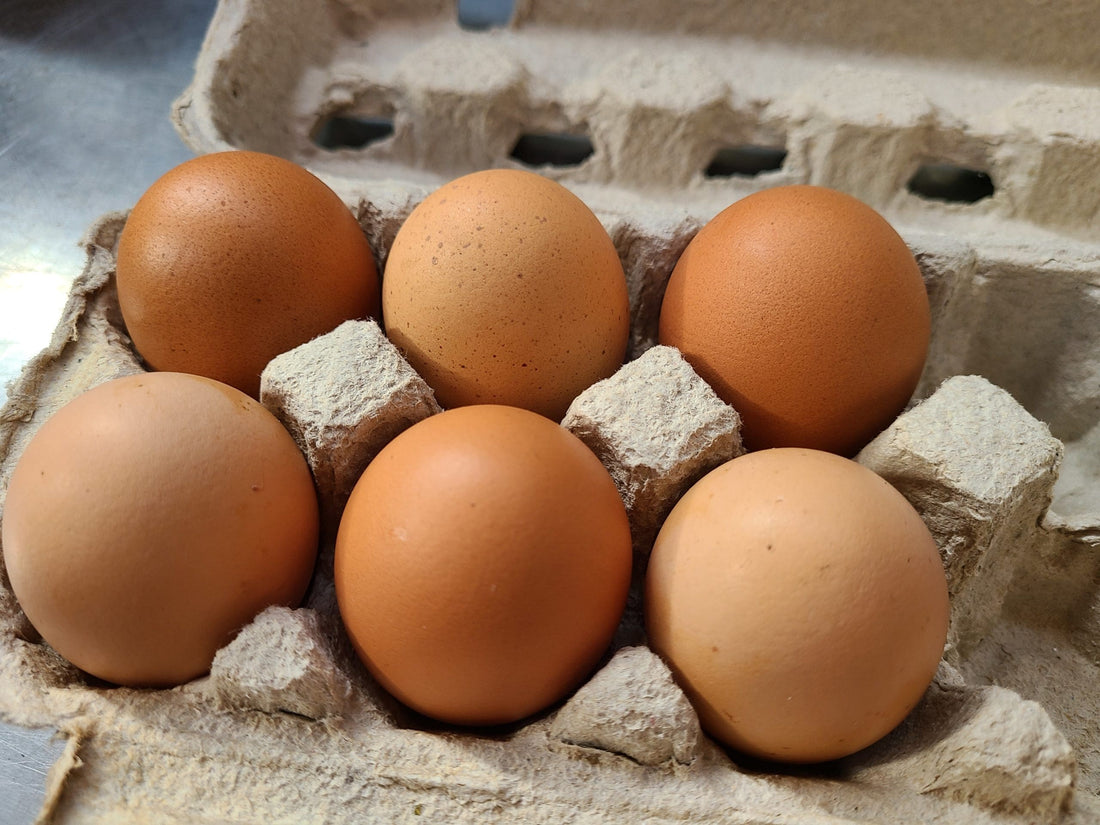In recent years, organic food has become a buzzword in the health and wellness world. Consumers are more conscious than ever about what they eat, and one food product that has garnered attention is eggs—specifically, organic eggs. Whether you’re an avid shopper at your local farmer’s market or someone who just wants to make healthier food choices, understanding the ins and outs of organic eggs can help you make informed decisions about your diet.
But what exactly does "organic" mean when it comes to eggs? Are they worth the extra cost? And how do they compare to conventional eggs in terms of nutrition, taste, and environmental impact?
In this blog post, we’ll explore the key aspects of organic eggs, from their production process to the benefits and potential downsides, so you can make the best choice for yourself and your family.
What Makes Eggs "Organic"?
To qualify as organic, eggs must come from hens that are raised according to strict guidelines set by organizations like the U.S. Department of Agriculture (USDA). These guidelines ensure that the hens are given access to the outdoors, fed organic feed, and raised in environments that are free from synthetic pesticides, antibiotics, and hormones.
Here are some key criteria for eggs to be considered organic:
-
Organic Feed: Organic hens must be fed feed that is grown without synthetic pesticides, chemical fertilizers, or genetically modified organisms (GMOs). This feed typically consists of grains like corn, soy, and wheat, all of which must be organic.
-
Access to the Outdoors: Organic certification requires that hens have access to the outdoors, where they can roam, scratch the ground, and engage in natural behaviors. This access is designed to promote their well-being and health. However, the amount of time they spend outdoors may vary depending on the farm.
-
No Synthetic Additives: Organic eggs come from hens that are not treated with synthetic hormones or antibiotics. This is one of the most important distinctions between organic and conventional eggs, as many non-organic farms use antibiotics to prevent disease and promote growth.
-
Sustainable Farming Practices: Organic farming emphasizes sustainability and environmental stewardship. Organic farms are often smaller-scale operations that prioritize soil health, biodiversity, and conservation practices.
Nutritional Comparison: Organic Eggs vs. Conventional Eggs
One of the most common reasons people opt for organic eggs is the belief that they are more nutritious than their conventional counterparts. While organic eggs are often praised for their higher omega-3 content and superior nutrient profile, the scientific evidence on this topic is mixed.
Omega-3 Fatty Acids: Organic eggs, especially those from hens that are pasture-raised or have access to a varied diet of grasses and insects, tend to have higher levels of omega-3 fatty acids. These beneficial fats are essential for heart health, brain function, and reducing inflammation.
Vitamin Content: Some studies suggest that organic eggs may contain slightly higher levels of certain vitamins, such as vitamin D, vitamin E, and vitamin A. However, these differences are generally modest and may not make a significant impact on your overall nutrient intake.
Antioxidants: Organic eggs have been shown to contain higher levels of certain antioxidants, including lutein and zeaxanthin, which are important for eye health. Again, the differences are relatively small, but they may still be a factor in your decision.
Fewer Contaminants: Organic eggs are less likely to contain residues from pesticides, antibiotics, or other harmful chemicals, which could be a concern when consuming conventional eggs. Choosing organic eggs reduces your exposure to these potential toxins.
Taste and Quality
Many people believe that organic eggs taste better than conventional eggs, and some swear by the richer flavour and creamier texture of organic eggs. While taste is subjective, there are a few reasons why organic eggs might have a distinct flavour:
-
Diet and Lifestyle: Hens that are fed a more varied diet of organic grains, seeds, and even access to pasture can produce eggs with a more complex flavor profile. Eggs from pasture-raised hens may have an earthier, fresher taste due to the hens’ varied diet, which includes natural forages like grass and insects.
-
Freshness: Many organic egg producers sell their eggs directly to consumers or through local farmers' markets, which can mean fresher eggs. Freshness plays a big role in taste, as eggs that are just a few days old tend to have better flavor and texture compared to eggs that have been sitting on store shelves for weeks.
-
Higher Quality Shells: Organic eggs often have thicker, stronger shells. This may be due to the hens being allowed to roam and forage, which promotes stronger bones and better overall health. The quality of the shell can impact how the egg cooks and holds up during preparation.
Environmental Impact of Organic Egg Farming
Choosing organic eggs isn’t just about personal health—it can also have a positive impact on the environment. Organic farming practices emphasize sustainability, soil health, and biodiversity, which means that organic egg production typically has a lower environmental footprint than conventional egg farming. Here’s why:
-
No Synthetic Pesticides or Fertilizers: Organic farms don’t use synthetic chemicals, which can pollute waterways and harm local ecosystems. By choosing organic eggs, you support farming practices that prioritize environmental health.
-
Animal Welfare: Organic farms often provide better living conditions for their hens, including more space to roam and access to the outdoors. This can lead to healthier, happier animals and a more humane approach to farming.
-
Soil Health and Biodiversity: Organic farms focus on building healthy soil through crop rotation, composting, and other sustainable practices. These methods help prevent soil degradation, promote biodiversity, and reduce the need for chemical inputs.
Are Organic Eggs Worth the Extra Cost?
One of the biggest barriers to buying organic eggs is the price. Organic eggs are typically more expensive than conventional eggs, sometimes by as much as 50% or more. But are they worth the cost? That depends on your priorities.
-
Health Considerations: If you’re concerned about pesticide exposure, hormones, and antibiotics, organic eggs can be a safer choice. The higher omega-3 content and nutrient profile may also appeal to those seeking to improve their diet.
-
Taste and Quality: If you prefer the taste of organic eggs and value the freshness and texture, the higher price tag may be justified.
-
Environmental and Ethical Considerations: If you’re committed to supporting sustainable farming practices and animal welfare, choosing organic eggs can align with your values.
Final Thoughts: Should You Choose Organic Eggs?
Organic eggs offer a range of benefits, from improved nutritional content to better animal welfare standards and a smaller environmental footprint. They may be worth the extra cost for those who prioritize health, sustainability, and ethical farming practices. However, if cost is a significant concern, it’s important to remember that any eggs—whether organic, conventional, or pasture-raised—can be part of a healthy diet when consumed in moderation.
Ultimately, the decision to buy organic eggs comes down to personal preferences, values, and budget. By understanding the production process and benefits of organic eggs, you can make an informed choice that aligns with your health and lifestyle goals.
If you’re looking to make the switch to organic eggs, consider exploring local farms or farmers' markets, where you can often find fresher eggs with the added bonus of supporting small-scale, sustainable agriculture. Whether you’re scrambling them for breakfast or using them in your favourite recipes, organic eggs can be a delicious and nutritious addition to your diet.










